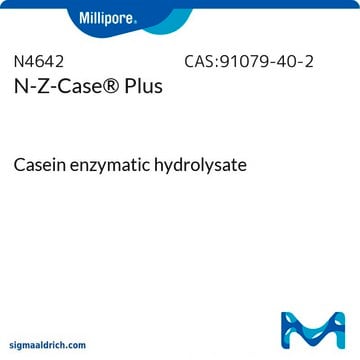C4464
EZMix N-Z-Amine® A
Casein enzymatic hydrolysate, from bovine milk
Synonym(s):
Peptone from casein
About This Item
Recommended Products
biological source
bovine milk
Quality Level
grade
for molecular biology
sterility
non-sterile
form
powder
application(s)
agriculture
(ffff123)
storage temp.
room temp
suitability
nonselective for Escherichia coli
nonselective for coliforms
Looking for similar products? Visit Product Comparison Guide
General description
Application
Features and Benefits
- Granulated, dust-free format for safer handling and faster mixing
- Easy scale-up using larger package sizes
Legal Information
related product
Storage Class Code
11 - Combustible Solids
WGK
WGK 1
Choose from one of the most recent versions:
Certificates of Analysis (COA)
Don't see the Right Version?
If you require a particular version, you can look up a specific certificate by the Lot or Batch number.
Already Own This Product?
Find documentation for the products that you have recently purchased in the Document Library.
Customers Also Viewed
Protocols
General protocols for growth of competent cells in microbial medium.
Our team of scientists has experience in all areas of research including Life Science, Material Science, Chemical Synthesis, Chromatography, Analytical and many others.
Contact Technical Service













